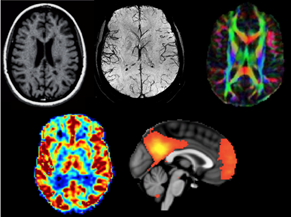Diagnostic Imaging Sciences Center
http://depts.washington.edu/mrlab/
Mission
Magnetic Resonance (MR) overcomes the limitations of imaging methods such as CT and x-ray imaging that are based solely on the measurement of attenuation of x-rays as they pass through tissues, which only provide gray scale structural images of the body. MRI has multidimensional capabilities that are ever expanding. For example, in addition to providing gray scale anatomic images, MRI allows scientists to Quantitatively measure the speed of blood flowing through an artery, observe the rate and direction of diffusion of water molecules through brain tissue, measure the concentration of tissue metabolites in ivo, and monitor brain function during the performance of a specific task.
The cornerstone of the DISC Lab is the Philips Ingenia Elition X 3T MRI system, capable of advanced structural and functional imaging as well as spectroscopy for human, animal, and phantom studies. The magnet has a 70cm bore and is equipped with a multi-transmit capable body coil and Philips Vega HP gradients which deliver a maximum amplitude of 45mT/m (slew rate 220 T/m/s). Current scanner software version R5.6.
The University of Washington Magnetic Resonance Research Laboratory has been providing access to state-of-the-art MR systems and technical expertise for more than a decade to scientists throughout the UW campus and has on-going research collaborations with many other scientific centers throughout the world. It serves as a major site for medical research, for the development of new technology, and for teaching. The laboratory is comprised of more than 25 research personnel that include physicists, physicians, biochemists, bioengineers, research technicians, and senior research fellows. In addition, it supports projects with affiliate researchers from more than 15 departments across the university campus including the departments of bioengineering, education, music, neurology, neurosurgery, psychiatry, psychology, rehabilitation medicine, and speech and hearing sciences. The laboratory continues to extend collaboration and support to aid in research throughout the UW Medicine community and throughout the world in order to increase scientific understanding and to promote the quality of health care.
Funding Information
National Institutes of Health (NIH): 90%
Research Royalty Fund (RRF): 0.3%
Private Institutes and Foundations: 9%
Other Government Sources (e.g. NASA, NSF): 0.7%
